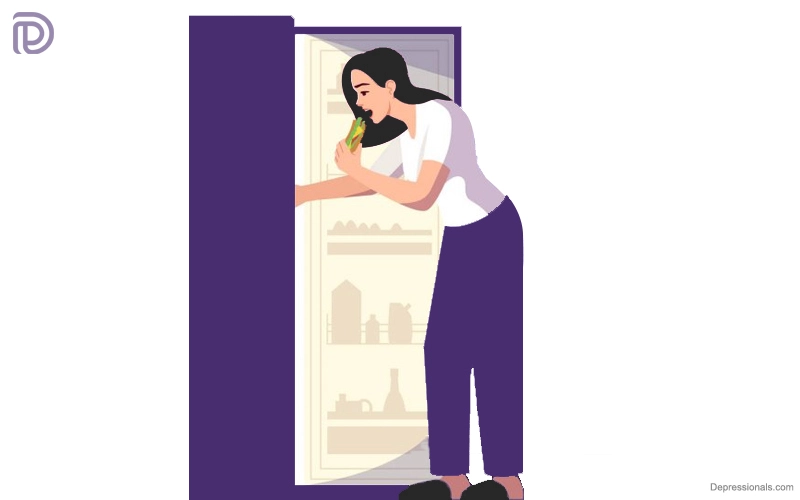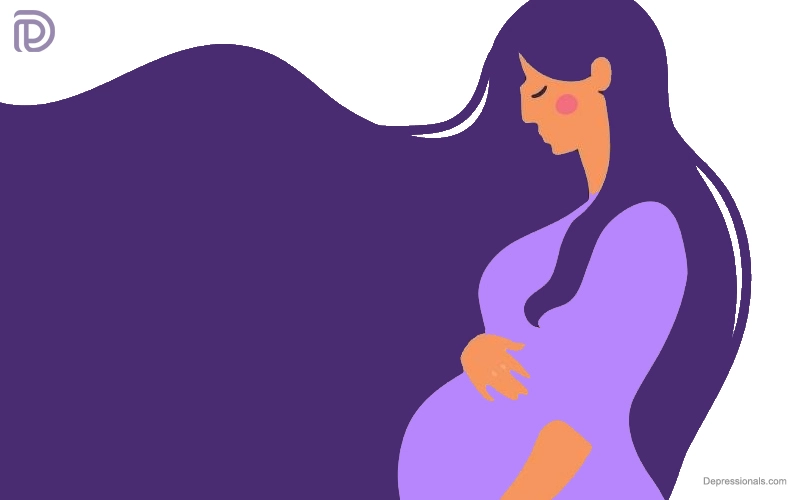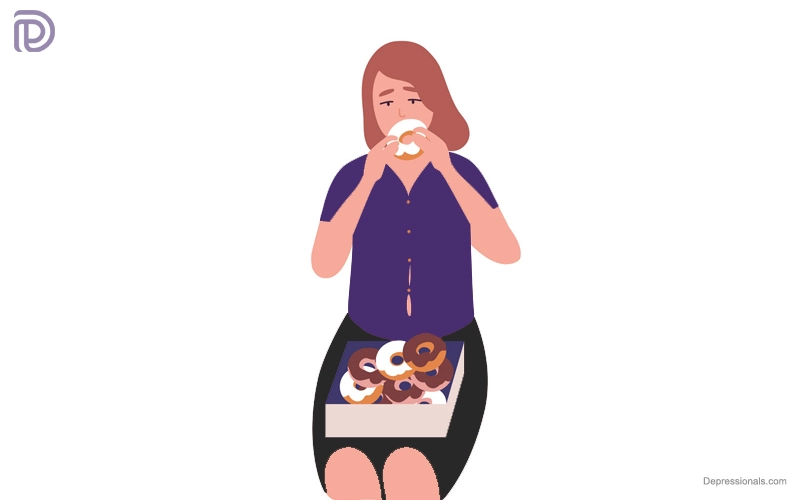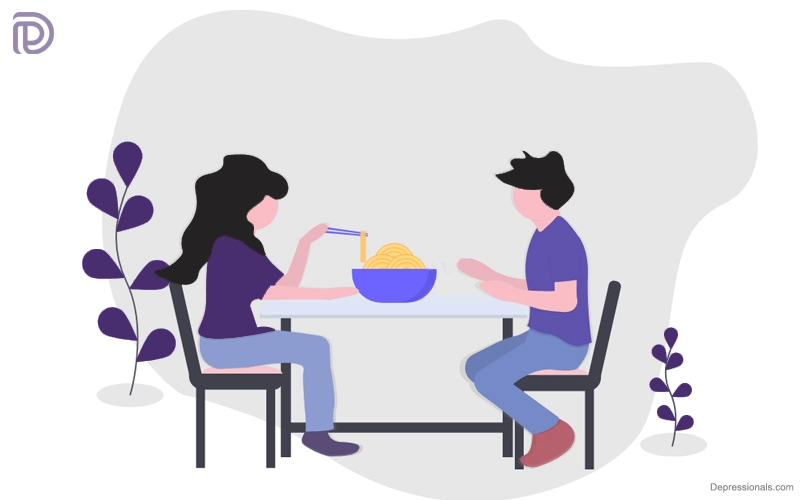Night eating syndrome (NES) is a disorder characterized by nighttime overeating and sleep disturbances. You eat a lot after dinner, have difficulty sleeping, and eat when you wake up in the middle of the night if you have NES.
Difference between NES and sleep-related eating disorder (SRED)
There is no such thing as sleepwalking or other abnormal sleep behavior (parasomnia) when it comes to NES. People with NES are fully awake while eating, unlike those with sleep-related eating disorders (SRED).
Sleep disturbances can cause people to wake up and eat during the night. When a person has SRED, they eat while they’re sleeping and forget about it the next day.
Night eating syndrome symptoms
After dinner, if you have NES, you consume at least a quarter of your daily calories. You’re both bothered by this truth.
If you have at least three of these symptoms and wake up to eat at least twice a week, you may have NES:
- In the morning, you don’t feel hungry.
- Between dinner and bedtime, a strong desire to eat
- Insomnia 4 or 5 nights a week
- A notion that eating is required to fall asleep or return to sleep.
- A sad state of mind that worsens throughout the evening
Binge eating disorder is not the same as night eating syndrome. You’re more inclined to consume a lot in one sitting if you’re on BED. If you have NES, you are more likely to consume smaller portions during the night.
Sleep-related eating disorder is not the same as NES. You’ll remember what you ate the night before with NES.
Read: Purging Disorder
Night eating syndrome causes
It’s unclear. Doctors believe it has something to do with problems with the sleep-wake cycle and hormones. Changes in your sleeping patterns and habits aren’t to blame.
If you’re fat or have another eating disorder, you’re more prone to develop night eating syndrome. People with NES are more likely to have a history of depression, anxiety or drug addiction.
NES affects about 1 of every 100 persons. There’s a 1 in 10 chance you have it if you’re fat.
Genetic reasons
A probable relationship between NES and genetics has been discovered by researchers. A gene called PER1 is considered to have a role in regulating your body clock. NES is thought to be caused by a gene abnormality, according to scientists. More investigation is required.
Check all: Psychological Disorders
What is the process of diagnosis?
After interviewing you about your sleep and eating patterns, your doctor will make a diagnosis of night eating syndrome. A comprehensive questionnaire may be part of this. You may also be subjected to a polysomnography sleep test. It assesses your:
- Brain waves
- Blood oxygen levels
- Heart and breathing rates
Polysomnography is usually performed at a hospital or sleep clinic.
You must overeat at night for at least 3 months to be diagnosed with NES. Substance abuse, a medical illness, medication, or any psychological issue cannot be the cause of the eating and sleeping patterns.
Health effects
Obesity is linked to NES, although it’s unclear if obesity is a cause or a consequence of NES. One thing is certain: the condition makes losing weight difficult. Not all studies have found that having NES causes you to eat more, and not everyone with NES is fat.
Sleep disturbances associated with NES may also lead to weight gain. You’re more prone to gain weight if you don’t get enough sleep.
Read: How to Stop Late Night Eating
Night eating syndrome treatments
Although little research has been done on NES, antidepressants and cognitive behavioral therapy seem helpful. Relaxation training was reported to help shift hunger from night to morning in short research.
Antidepressants were found to improve night eating, mood and quality of life in several trials.
Melatonin or melatonin-boosting medications can also help with NES.
Always consult your doctor before taking any medication.
Interesting facts about night eating syndrome
Researchers are still struggling to understand NES, despite its use by eating disorder professionals. It has been difficult to ascertain a firm understanding of NES due to the many theories surrounding its emergence, prevalence, and cognitions. In light of what has so far been discovered, the following conclusions can be drawn:
- It has been documented in psychological literature since around 1955 that NES symptoms exist.
- Patients with other eating disorders are more likely to have NES.
- Binge eaters who suffer from NES are 15 to 44% more likely to undergo an investigation for NES.
- Bulimia Nervosa patients experience NES 9 to 47% of the time.
- An estimated 12.3% of patients in the psychiatric field meet NES criteria.
- Substance use disorders were present in 30.6% of people with NES.
- More than one atypical antipsychotic is prescribed to NES patients than to non-NES patients.
Read: 15 Simple Tips to Stop Binge Eating
Is it possible to prevent NES?
There is no way to prevent NES. The following steps will help you to get proper sleep and improve your health:
- Consuming healthy foods: Home is the only place where you should have healthy foods. You can avoid indulging in high-fat and sugar foods at night by eliminating them.
- Sleep hygiene is important: Try to sleep at the same time every day, and keep the bedroom at a comfortable temperature. When you are getting ready to go to bed, avoid caffeine and electronics.
- Maintaining your mental health: Stress can be managed by meditating and breathing deeply. Speak to your provider if you feel anxious or sad. The benefits of counseling and therapy include improving your mood and managing emotions.
- Maintaining an active lifestyle during the day: Your sleep improves when you exercise and exercise regularly during the day.
Bottom line
You may feel humiliated and hesitant to seek therapy if you are having symptoms that are consistent with night eating syndrome. Please don’t be afraid to get treatment; eating disorder specialists can assist you in your recovery.






I like what you guys are up also. Such clever work and reporting! Keep up the excellent works guys I have incorporated you guys to my blogroll. I think it will improve the value of my site 🙂
Thanks a lot for your post.
I haven’t checked in here for some time as I thought it was getting boring, but the last few posts are great quality so I guess I’ll add you back to my everyday blog list. You deserve it my friend 🙂
You can definitely see your skills in the work you write. The world hopes for even more passionate writers like you who aren’t afraid to say how they believe. Always go after your heart.
I have read a few excellent stuff here. Definitely value bookmarking for revisiting. I wonder how much effort you put to make one of this wonderful informative sites.
I appreciate, cause I found just what I was looking for. You’ve ended my 4 day long hunt! God Bless you man. Have a nice day. Bye
Excellent blog you have here but I was curious if you knew of any user discussion forums that cover the same topics discussed in this article? I’d really love to be a part of community where I can get advice from other knowledgeable people that share the same interest. If you have any suggestions, please let me know. Cheers!
A formidable share, I simply given this onto a colleague who was doing slightly evaluation on this. And he in truth bought me breakfast as a result of I found it for him.. smile. So let me reword that: Thnx for the deal with! But yeah Thnkx for spending the time to debate this, I feel strongly about it and love reading extra on this topic. If attainable, as you turn into experience, would you thoughts updating your blog with more particulars? It is extremely useful for me. Big thumb up for this weblog publish!
You could definitely see your skills within the work you write. The sector hopes for even more passionate writers such as you who are not afraid to mention how they believe. All the time go after your heart.
Valuable info. Lucky me I found your website by accident, and I’m shocked why this accident didn’t happened earlier! I bookmarked it.
I wanted to compose you one very small observation to finally thank you so much once again just for the fantastic advice you have shared on this page. I am certain there are a lot more fun times in the future for many who discover your blog.
Thanks for the suggestions shared on your blog.
Hi there I am so happy I found your website, I really found you by accident, while I was researching on Google for something else, Regardless I am here now and would just like to say thanks a lot for a tremendous post and a all round enjoyable blog (I also love the theme/design), I don’t have time to read it all at the moment but I have book-marked it and also included your RSS feeds, so when I have time I will be back to read more, Please do keep up the excellent work.
It’ll laborious to seek out educated folks on this subject, however you sound like you recognize what you’re talking about! Thanks
This is very interesting, You are a very skilled blogger. I have joined your rss feed and look forward to seeking more of your excellent post. Also, I’ve shared your website in my social networks!
Hello.This post was extremely motivating, especially because I was browsing for thoughts on this topic last week.
There’s noticeably a bundle to learn about this. I assume you made sure nice factors in features also.
I’ll immediately grab your rss feed as I can’t find your email subscription link or newsletter service. Do you’ve any? Please let me know in order that I could subscribe. Thanks.
Thank you sharing these kind of wonderful posts. In addition, the right travel in addition to medical insurance system can often eliminate those concerns that come with visiting abroad. Some sort of medical emergency can soon become costly and that’s bound to quickly put a financial burden on the family’s finances. Putting in place the perfect travel insurance package deal prior to setting off is well worth the time and effort. Cheers
I’m not that much of a online reader to be honest but your sites really nice, keep it up! I’ll go ahead and bookmark your website to come back in the future. Many thanks
Great ?V I should certainly pronounce, impressed with your site. I had no trouble navigating through all tabs and related information ended up being truly easy to do to access. I recently found what I hoped for before you know it at all. Reasonably unusual. Is likely to appreciate it for those who add forums or something, site theme . a tones way for your client to communicate. Nice task..